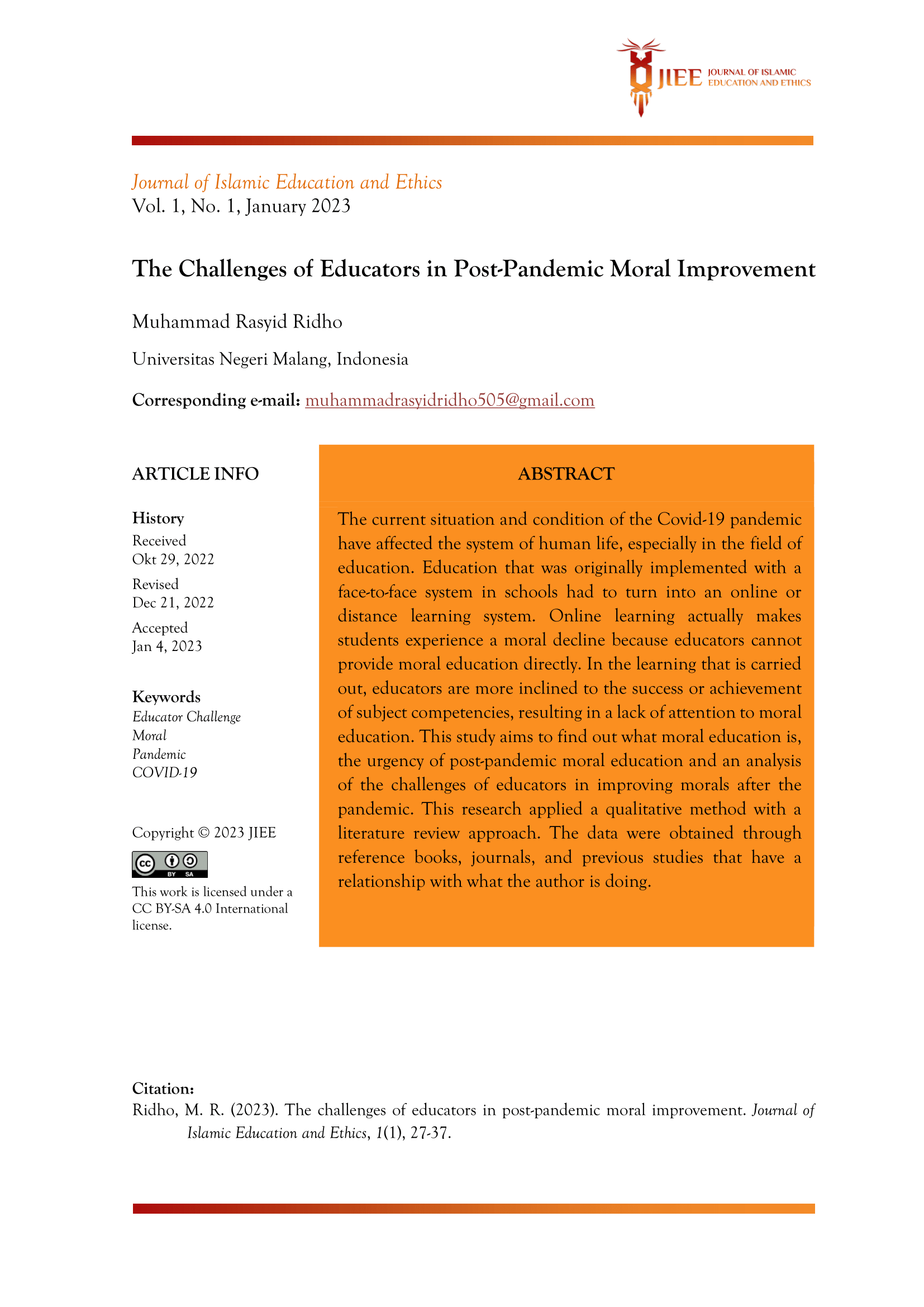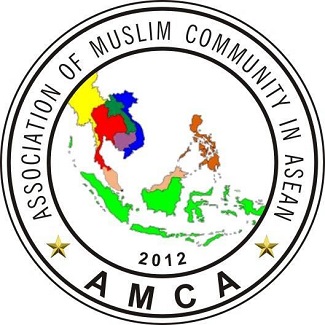The Challenges of Educators in Post-Pandemic Moral Improvement
DOI:
https://doi.org/10.18196/jiee.v1i1.3Keywords:
Educator Challenge, Moral, Pandemic, COVID-19Abstract
The current situation and condition of the Covid-19 pandemic has affected the system of human life, especially in the education sector. Education that was initially carried out with a learning system in schools had to change to an online learning system. Online learning actually makes students or students experience a moral decline caused because educators cannot provide moral education directly. In the learning that is carried out, educators are more inclined to the success or achievement of subjects, resulting in the absence of moral education. This study aims to find out what moral education is, the urgency of post-pandemic moral education and an analysis of educators' challenges in moral improvement after the pandemic. In this research method uses a qualitative method with a literature review approach. The data obtained from this research is through reference books, journals, and previous research that has a relationship with what the author is doing
Downloads
References
Arifin, M. L. (2016). Konsep pendidikan moral menurut Said Nursi. Dialektika: Jurnal Pemikiran dan Penelitian Pendidikan Dasar, 5(1).
Blankenberger, B., & Williams, A. M. (2020). COVID and the impact on higher education: The essential role of integrity and accountability. Administrative Theory and Praxis, 42(3), 404–423. https://doi.org/10.1080/10841806.2020.1771907
Cahyaningrum, E. S., Sudaryanti, S., & Purwanto, N. A. (2017). Pengembangan nilai-nilai karakter anak usia dini melalui pembiasaan dan keteladanan. Jurnal Pendidikan Anak, 6(2), 203–213. https://doi.org/10.21831/jpa.v6i2.17707
Fatiha, N., & Nuwa, G. (2020). Kemerosotan Moral Siswa Pada Masa Pandemic Covid 19: Meneropong Eksistensi Guru Pendidikan Agama Islam. ATTA’DIB: Jurnal Pendidikan Agama Islam, 1(2), 1–17.
Firman, & Rahman, S. R. (2020). Pembelajaran online di tengah pandemi COVID-19. Indonesian Journal of Educational Science (IJES), 2(2), 81–89. https://doi.org/10.31605/ijes.v2i2.659
Gurusamy, V., & Thambu, N. (2018). Development of Moral Motivation Through Acting Activities in Teaching and Learning of Moral Education in Secondary Schools. Muallim Journal of Social Sciences and Humanities, 2(4), 234–250.
Jahroh, W. S., & Sutarna, N. (2016). Pendidikan Karakter Sebagai Upaya Mengatasi Degradasi Moral. Prosiding Seminar Nasional Inovasi Pendidikan, 395–402.
Jalaludin, & Hartati, S. (2020). Urgensi Pendidikan Moralitas di Sekolah. Prosiding International Seminar on Islamic Studies and Education (ISoISE), 155–168.
Khaironi, M. (2017). Pendidikan Moral Pada Anak Usia Dini. Jurnal Golden Age, 1(01), 1–16. https://doi.org/10.29408/goldenage.v1i01.479
Laksana, S. D. (2015). Urgensi pendidikan karakter di sekolah. MUADDIB: Jurnal Studi Kepenendidikan dan Keislaman, 5(1), 167–184. http://dx.doi.org/10.24269/muaddib.v5i2.67
Le Grange, L. (2020). Covid-19 pandemic and the prospects of education in South Africa. Prospects, 0123456789. https://doi.org/10.1007/s11125-020-09514-w
Machmud, H. (2014). Urgensi pendidikan moral dalam membentuk kepribadian anak. Al-TA'DIB: Jurnal Kajian Ilmu Kependidikan, 7(2), 75–84. http://dx.doi.org/10.31332/atdb.v7i2.318
Moore, J. L., Dickson-Deane, C., & Galyen, K. (2011). E-Learning, online learning, and distance learning environments: Are they the same?. Internet and Higher Education, 14(2), 129–135. https://doi.org/10.1016/j.iheduc.2010.10.001
Prasetyani, Y., & Az-Zafi, A. (2021). Educational Solutions Amid a Moral Pandemic: Case Study at Islamic High School (MAN) 2 Kudus Boarding School. Al-Hayat: Journal of Islamic Education, 5(1), 71–76. https://doi.org/10.35723/ajie.v5i1.168
Reksiana. (2018). Kerancuan istilah karakter, akhlak, moral dan etika. Thaqafiyyat : Jurnal Bahasa, Peradaban dan Informasi Islam, 19(1), 1–30.
Rohendi, E. (2016). Pendidikan karakter di sekolah. Jurnal Pendidikan Dasar Kampus Cibiru, 3(1). https://doi.org/10.17509/eh.v3i1.2795
Saifuddin, M. A., & Hanik, E. U. (2020). Pembelajaran daring pemicu degradasi moral pendidikan di era pandemi COVID-19. Al Hikmah: Journal of Education, 1(2), 193–200. https://doi.org/10.54168/ahje.v1i2.24
Santoso, Suyahmo, Maman, R., & Utomo, C. B. (2020). Urgensi Pendidikan Karakter Pada Masa Pandemi Covid 19. Seminar Nasional Pascasarjana Universitas Negeri Semarang, 558–563.
Sinulingga, S. P. (2016). Teori Pendidikan Moral Menurut Emile Durkheim Relevansinya Bagi Pendidikan Moral Anak Di Indonesia. Jurnal Filsafat, 26(2), 214–248. https://doi.org/10.22146/jf.12784
Surur, M. (2010). Problematika pendidikan moral di sekolah dan upaya pemecahannya. Fikroh: Jurnal Pemikiran dan Pendidikan Islam, 4(2), 126–136. https://doi.org/10.37812/fikroh.v12i1.42
Syaparuddin, S., & Elihami, E. (2019). Peranan pendidikan nonformal dan sarana pendidikan moral. Jurnal Edukasi Nonformal, 1(1), 173–186.
Tenrere, S. B., Farizal, F., & Rifa’i, A. (2020). Pengaruh pendidikan moral dan kompetensi sosial guru terhadap pembentukan karakter siswa SMP Manba’Ul Ulum Jakarta. Andragogi: Jurnal Pendidikan Islam Dan Manajemen Pendidikan Islam, 2(3), 39–61. https://doi.org/10.36671/andragogi.v2i3.115
Ulfatin, N. (2015). Metode Penelitian Kualitatif di Bidang Pendidikan: Teori dan Aplikasinya. Media Nusa Creative.

Downloads
Published
How to Cite
Issue
Section
License
Copyright (c) 2023 Journal of Islamic Education and Ethics

This work is licensed under a Creative Commons Attribution-ShareAlike 4.0 International License.




